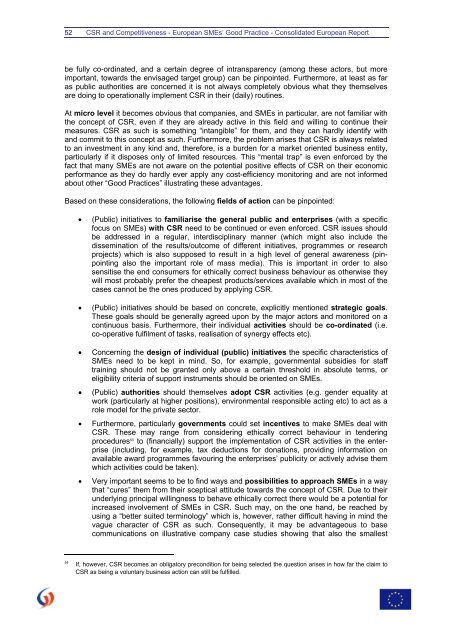CSR and Competitiveness European SMEs - KMU Forschung Austria
CSR and Competitiveness European SMEs - KMU Forschung Austria
CSR and Competitiveness European SMEs - KMU Forschung Austria
You also want an ePaper? Increase the reach of your titles
YUMPU automatically turns print PDFs into web optimized ePapers that Google loves.
52 <strong>CSR</strong> <strong>and</strong> <strong>Competitiveness</strong> - <strong>European</strong> <strong>SMEs</strong>’ Good Practice - Consolidated <strong>European</strong> Report<br />
be fully co-ordinated, <strong>and</strong> a certain degree of intransparency (among these actors, but more<br />
important, towards the envisaged target group) can be pinpointed. Furthermore, at least as far<br />
as public authorities are concerned it is not always completely obvious what they themselves<br />
are doing to operationally implement <strong>CSR</strong> in their (daily) routines.<br />
At micro level it becomes obvious that companies, <strong>and</strong> <strong>SMEs</strong> in particular, are not familiar with<br />
the concept of <strong>CSR</strong>, even if they are already active in this field <strong>and</strong> willing to continue their<br />
measures. <strong>CSR</strong> as such is something “intangible” for them, <strong>and</strong> they can hardly identify with<br />
<strong>and</strong> commit to this concept as such. Furthermore, the problem arises that <strong>CSR</strong> is always related<br />
to an investment in any kind <strong>and</strong>, therefore, is a burden for a market oriented business entity,<br />
particularly if it disposes only of limited resources. This “mental trap” is even enforced by the<br />
fact that many <strong>SMEs</strong> are not aware on the potential positive effects of <strong>CSR</strong> on their economic<br />
performance as they do hardly ever apply any cost-efficiency monitoring <strong>and</strong> are not informed<br />
about other “Good Practices” illustrating these advantages.<br />
Based on these considerations, the following fields of action can be pinpointed:<br />
• (Public) initiatives to familiarise the general public <strong>and</strong> enterprises (with a specific<br />
focus on <strong>SMEs</strong>) with <strong>CSR</strong> need to be continued or even enforced. <strong>CSR</strong> issues should<br />
be addressed in a regular, interdisciplinary manner (which might also include the<br />
dissemination of the results/outcome of different initiatives, programmes or research<br />
projects) which is also supposed to result in a high level of general awareness (pinpointing<br />
also the important role of mass media). This is important in order to also<br />
sensitise the end consumers for ethically correct business behaviour as otherwise they<br />
will most probably prefer the cheapest products/services available which in most of the<br />
cases cannot be the ones produced by applying <strong>CSR</strong>.<br />
• (Public) initiatives should be based on concrete, explicitly mentioned strategic goals.<br />
These goals should be generally agreed upon by the major actors <strong>and</strong> monitored on a<br />
continuous basis. Furthermore, their individual activities should be co-ordinated (i.e.<br />
co-operative fulfilment of tasks, realisation of synergy effects etc).<br />
• Concerning the design of individual (public) initiatives the specific characteristics of<br />
<strong>SMEs</strong> need to be kept in mind. So, for example, governmental subsidies for staff<br />
training should not be granted only above a certain threshold in absolute terms, or<br />
eligibility criteria of support instruments should be oriented on <strong>SMEs</strong>.<br />
• (Public) authorities should themselves adopt <strong>CSR</strong> activities (e.g. gender equality at<br />
work (particularly at higher positions), environmental responsible acting etc) to act as a<br />
role model for the private sector.<br />
• Furthermore, particularly governments could set incentives to make <strong>SMEs</strong> deal with<br />
<strong>CSR</strong>. These may range from considering ethically correct behaviour in tendering<br />
procedures 54 to (financially) support the implementation of <strong>CSR</strong> activities in the enterprise<br />
(including, for example, tax deductions for donations, providing information on<br />
available award programmes favouring the enterprises’ publicity or actively advise them<br />
which activities could be taken).<br />
• Very important seems to be to find ways <strong>and</strong> possibilities to approach <strong>SMEs</strong> in a way<br />
that “cures” them from their sceptical attitude towards the concept of <strong>CSR</strong>. Due to their<br />
underlying principal willingness to behave ethically correct there would be a potential for<br />
increased involvement of <strong>SMEs</strong> in <strong>CSR</strong>. Such may, on the one h<strong>and</strong>, be reached by<br />
using a “better suited terminology” which is, however, rather difficult having in mind the<br />
vague character of <strong>CSR</strong> as such. Consequently, it may be advantageous to base<br />
communications on illustrative company case studies showing that also the smallest<br />
54<br />
If, however, <strong>CSR</strong> becomes an obligatory precondition for being selected the question arises in how far the claim to<br />
<strong>CSR</strong> as being a voluntary business action can still be fulfilled.




